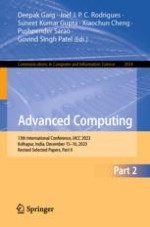2024 | OriginalPaper | Chapter
Damage Evaluation Following Natural Disasters Using Deep Learning
Authors : Neha Gupta, Shikha Chadha, Rosey Chauhan, Pooja Singhal
Published in: Advanced Computing
Publisher: Springer Nature Switzerland
Activate our intelligent search to find suitable subject content or patents.
Select sections of text to find matching patents with Artificial Intelligence. powered by
Select sections of text to find additional relevant content using AI-assisted search. powered by
